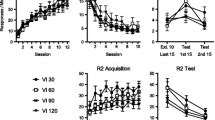Abstract
In a series of experiments, it was shown that various histories of response omission can have suppressive effects on the operant responding of humans under a fixed-ratio (FR) schedule of reinforcement. Response omission was produced during these histories by making reinforcement contingent upon it, by reinforcing low rates of temporally spaced responding, by withdrawing reinforcement, or by introducing punishment for responding. Response suppression under FR varied with the number, type, and sequence of these response omission histories and was prevented when individuals were given an FR history in addition to a history of response omission. Extinction processes in moving from a history of response omission to FR contributed, in part, to the suppressive effects obtained under FR. Both normal humans and schizophrenics exhibited response suppression under FR following a history of response omission. The schizophrenics showed greater behavioral persistence and lower rates of FR responding than the normals. Normals given a history of response omission tended to perform like schizophrenics not given such a history. Taken together with previous research, the findings emphasize the importance of historical factors in human operant behavior and the role such factors may play in determining the behavioral differences of different people under schedules of reinforcement.
Similar content being viewed by others
References
BARON, A., KAUFMAN, A., & STAUBER, K. 1969. Effects of instruction and reinforcement-feedback on human operant behavior maintained by fixed-interval reinforcement. Journal of the Experimental Analysis of Behavior, 12, 701–712.
BIJOU, S.W. 1958. Operant extinction after fixed-interval schedules with young children. Journal of the Experimental Analysis of Behavior, 1, 25–29.
HUTCHINSON, R.R., & AZRIN, N.H. 1961. Conditioning of mental-hospital patients to fixed-ratio schedules of reinforcement. Journal of the Experimental Analysis of Behavior, 4, 87–95.
KING, H.E. 1975. Psychomotor correlates of behavior disorder. In M. Kietzman, S. Sutton, & J. Zubin (Eds.). Experimental approaches to psychopathology. New York: Academic Press.
LeBLANC, J.M., REUTER, K.E., MILLER, D.N., & SCHILMOELLER, G. 1977. Laboratory investigations of applied behavior analysis techniques: Procedures designed to decrease or eliminate responding. In B.C. Etzel, J.M. LeBlanc, & D.M. Baer (Eds.). New developments in behavioral research. Hillsdale, N.J.: Lawrence Erlbaum Associates.
LINDSLEY, O.R. 1960. Characteristics of the behavior of chronic psychotics as revealed by free-operant conditioning methods. Diseases of the Nervous System, Monograph Supplement, 21, 66–78.
SIDMAN, M. 1960. Tactics of scientific research. New York: Basic Books.
THOMPSON, T., HEISTAD, G.T., & PALERMO, D.S. 1963. Effects of amount of training on rate and duration of responding during extinction. Journal of the Experimental A nalysis of Behavior, 6, 155–161.
ULLMANN, L.P., & KRASNER, L. 1969. A psychological approach to abnormal behavior. Englewood Cliffs, N.J.: Prentice-Hall.
WEAVER, L.A., & BROOKS, G.W. 1964. The use of psychomotor tests in predicting the potential of chronic schizophrenics. Journal of Neuropsychiatry, 5, 170–180.
WEINER, H. 1962. Some effects of response cost upon human operant behavior. Journal of the Experimental Analysis of Behavior, 5, 201–208.
WEINER, H. 1963a. Operant programming with transistorized digital elements. Journal of the Experimental Analysis of Behavior, 6, 193–195.
WEINER, H. 1963b. Response cost and the aversive control of human operant behavior. Journal of the Experimental A nalysis of Behavior, 6, 415–421.
WEINER, H. 1964a. Conditioning history and human fixed-interval performance. Journal of the Experimental Analysis of Behavior, 7, 383–385.
WEINER, H. 1964b. Response cost effects during extinction following fixed-interval reinforcement in humans. Journal of the Experimental Analysis of Behavior, 7, 333–335.
WEINER, H. 1965. Conditioning history and maladaptive human operant behavior. Psychological Reports, 17, 935–942.
WEINER, H. 1969a. Conditioning history and the control of human avoidance and escape responding. Journal of the Experimental Analysis of Behavior, 12, 1039–1043.
WEINER, H. 1969b. Controlling human fixed-interval performance. Journal of the Experimental Analysis of Behavior, 12, 349–373.
WEINER, H. 1970a. History related effects upon escape responding: Are induction or extinction processes involved. Psychonomic Science, 20, 207–208.
WEINER, H. 1970b. Human behavioral persistence. The Psychological Record, 20, 445–456.
WEINER, H. 1970. Instructional control of human operant responding during extinction following fixed-ratio conditioning. Journal of the Experimental Analysis of Behavior, 13, 391–394.
WEINER, H. 1979. Some observations on apathetic operant responding of chronic schizophrenics. Perceptual and Motor Skills, 48, 1083–1090.
WEINER, H. 1981. Contributions of reinforcement schedule histories to our understanding of drug effects in human subjects. In T. Thompson & C.E. Johanson (Eds.). Behavioral pharmacology of human drug dependence. National Institute on Drug Abuse Research Monograp 37. Washington, D.C.: U.S. Government Printing Office.
Author information
Authors and Affiliations
Rights and permissions
About this article
Cite this article
Weiner, H. Histories of Response Omission and Human Operant Behavior Under a Fixed-Ratio Schedule of Reinforcement. Psychol Rec 32, 409–434 (1982). https://doi.org/10.1007/BF03394799
Published:
Issue Date:
DOI: https://doi.org/10.1007/BF03394799




